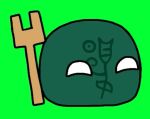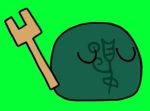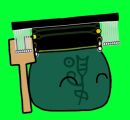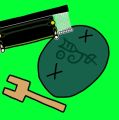Xia Dynasty
“
於!帝念哉!德惟善政,政在養民。水、火、金、木、土、穀,惟修;正德、利用、厚生、惟和。九功惟敘,九敘惟歌。戒之用休,董之用威,勸之以九歌俾勿壞。[1]
— ![]() Yu the Great
Yu the Great
The Xia Dynasty, sometimes spelled the Hsia Dynasty, is the first dynasty in ![]() Chinese history. It is uncertain exactly when he existed, but legends say he was founded after a great flood. Due to the lack of direct evidence of Xia’s existence, some scholars debate that the Xia Dynasty was completely fictional.
Chinese history. It is uncertain exactly when he existed, but legends say he was founded after a great flood. Due to the lack of direct evidence of Xia’s existence, some scholars debate that the Xia Dynasty was completely fictional.
The national color of Xia is grue-black and his element is water. The major innovation of Xia was the bronze caldron [鑄鼎] (unfortunately, it is currently archaeologically undiscovered). During its time, the Xia was the most powerful state, culture and peoples in the east.
歷史 (History)
开國 (Beginnings)
The Xia Dynasty was founded after ![]() Yu the Great, after 13 years of nonstop work, channeled all the flood water out of China after a giant flood. Yu the Great became the first ruler of the newly founded Xia Dynasty, and the people were happy. Yu the Great's leadership and engineering prowess not only secured his place as the first ruler of the Xia Dynasty but also set a precedent for future governance and societal organization. His success in flood control demonstrated the importance of strong, centralized authority and infrastructure development, laying the groundwork for the stability and prosperity of the Xia Dynasty.
Yu the Great, after 13 years of nonstop work, channeled all the flood water out of China after a giant flood. Yu the Great became the first ruler of the newly founded Xia Dynasty, and the people were happy. Yu the Great's leadership and engineering prowess not only secured his place as the first ruler of the Xia Dynasty but also set a precedent for future governance and societal organization. His success in flood control demonstrated the importance of strong, centralized authority and infrastructure development, laying the groundwork for the stability and prosperity of the Xia Dynasty.
![]() Yu the Great also divided his land into nine provinces and improved agricultural systems. The Xia Dynasty also practiced some bronze making, though not as advanced as the later dynasties. There are some pots and pans discovered that is thought to have belonged to the Xia Dynasty.
Yu the Great also divided his land into nine provinces and improved agricultural systems. The Xia Dynasty also practiced some bronze making, though not as advanced as the later dynasties. There are some pots and pans discovered that is thought to have belonged to the Xia Dynasty.
Yu the Great was the first ![]() Chinese ruler to pass their reign down to his descendants (the rulers before chose the most virtuous person to be the next ruler), but that would later be proved to me a mistake.
Chinese ruler to pass their reign down to his descendants (the rulers before chose the most virtuous person to be the next ruler), but that would later be proved to me a mistake.
![]() Yu’s son,
Yu’s son, ![]() Qi of Xia, did not care for the people at all. (In fact he didn’t even want to become king, but the public pressured him to do so.) His brother criticized him, but he didn’t listen. Eventually his brother had enough and waged war against him, but
Qi of Xia, did not care for the people at all. (In fact he didn’t even want to become king, but the public pressured him to do so.) His brother criticized him, but he didn’t listen. Eventually his brother had enough and waged war against him, but ![]() Qi defeated him, cut off his head, and made his whole family slaves.
Qi defeated him, cut off his head, and made his whole family slaves. ![]() Qi had 5 sons, who all fought each other for the throne. Eventually, a son named
Qi had 5 sons, who all fought each other for the throne. Eventually, a son named ![]() Tai Kang won out.
Tai Kang won out.
间歇期 (Interregnum)
The third Xia king, ![]() Tai Kang, was known for his avid hunting but was considered an ineffective ruler. According to the Bamboo Annals, while
Tai Kang, was known for his avid hunting but was considered an ineffective ruler. According to the Bamboo Annals, while ![]() Tai Kang was away on a hunting expedition beyond the
Tai Kang was away on a hunting expedition beyond the ![]() Henan Luo River, the Xia capital at
Henan Luo River, the Xia capital at ![]() Zhenxun was attacked by
Zhenxun was attacked by ![]() Hou Yi, leader of the
Hou Yi, leader of the ![]() Qiang peoples. This occupation of
Qiang peoples. This occupation of ![]() Zhenxun marked the beginning of a significant interregnum. In the eighth year of the reign of
Zhenxun marked the beginning of a significant interregnum. In the eighth year of the reign of ![]() Tai Kang's nephew, king
Tai Kang's nephew, king ![]() Xiang,
Xiang, ![]() Hou Yi was killed by his former chief minister,
Hou Yi was killed by his former chief minister, ![]() Han Zhuo. Twenty years later,
Han Zhuo. Twenty years later, ![]() Han Zhuo's forces killed king
Han Zhuo's forces killed king ![]() Xiang and usurped the throne, although the royal family managed to escape.
Xiang and usurped the throne, although the royal family managed to escape.
![]() Xiang's son,
Xiang's son, ![]() Shao Kang, was sheltered by a tribal chief, surviving for years as a fugitive despite
Shao Kang, was sheltered by a tribal chief, surviving for years as a fugitive despite ![]() Han Zhuo's efforts to eliminate him and prevent the reemergence of the Xia Dynasty. Upon reaching adulthood,
Han Zhuo's efforts to eliminate him and prevent the reemergence of the Xia Dynasty. Upon reaching adulthood, ![]() Shao Kang began organizing with local lords who despised
Shao Kang began organizing with local lords who despised ![]() Han Zhuo's rule.
Han Zhuo's rule. ![]() Shao Kang ultimately emerged victorious in the ensuing military confrontation, leading to
Shao Kang ultimately emerged victorious in the ensuing military confrontation, leading to ![]() Han Zhuo's suicide. The reigns of
Han Zhuo's suicide. The reigns of ![]() Shao Kang and his son
Shao Kang and his son ![]() Zhu are traditionally characterized as among the most prosperous periods in the history of the Xia Dynasty.
Zhu are traditionally characterized as among the most prosperous periods in the history of the Xia Dynasty.
擴張和城牆 (Expansion and Walls)
As the Xia Dynasty expanded and established an empire, he needed protection from the powerful ![]() barbarians whose archery skills were unmatched. So, Xia Dynasty decided to build big walls around cities, the closer to the emperor, the taller. Captured enemies were made slaves to work on the walls, but the comfort the wall provided made the last kings of Xia extremely materialistic, to heaven’s disgrace.
barbarians whose archery skills were unmatched. So, Xia Dynasty decided to build big walls around cities, the closer to the emperor, the taller. Captured enemies were made slaves to work on the walls, but the comfort the wall provided made the last kings of Xia extremely materialistic, to heaven’s disgrace.
灭亡 (Fall)
The last king of Xia, ![]() Jie, was tyrannical and immoral. He would put people on burning pillars and make them crawl on it just to get a laugh. While the peasants were starving, he would create a pool full of wine for his friends to drink, and when people got drunk and drowned in the pool, he didn’t bat an eye. He also created forests hanging with meat (very wasteful). Natural disasters were rampant. The Xia has officially lost their Mandate of Heaven.
Jie, was tyrannical and immoral. He would put people on burning pillars and make them crawl on it just to get a laugh. While the peasants were starving, he would create a pool full of wine for his friends to drink, and when people got drunk and drowned in the pool, he didn’t bat an eye. He also created forests hanging with meat (very wasteful). Natural disasters were rampant. The Xia has officially lost their Mandate of Heaven.
A neighboring tribe, the ![]() Shang clan, saw this chaos unfold within the once so powerful Xia Empire. Their leader,
Shang clan, saw this chaos unfold within the once so powerful Xia Empire. Their leader, ![]() Cheng Tang, lead an army to invade the Xia. As the
Cheng Tang, lead an army to invade the Xia. As the ![]() Shang army stormed through the villages and palaces, they told the people that they are only here for
Shang army stormed through the villages and palaces, they told the people that they are only here for ![]() Jie. Many Xia people joined the
Jie. Many Xia people joined the ![]() Shang, and their army grew stronger and stronger.
Shang, and their army grew stronger and stronger. ![]() Jie’s forces were destroyed in a storm so
Jie’s forces were destroyed in a storm so ![]() Jie fled. The
Jie fled. The ![]() Shang Dynasty was established. King
Shang Dynasty was established. King ![]() Tang gave the remnants of the Xia clan a fief comprising the small state of
Tang gave the remnants of the Xia clan a fief comprising the small state of ![]() Qǐ. This practice is known as "the two crownings and the three respects".
Qǐ. This practice is known as "the two crownings and the three respects".
龍 (Long/Chinese Dragons)
It is said that Chinese dragons were normal semi-divine creatures that existed in the Xia Dynasty, with even accounts on “dragon tamers” who train the dragons. These dragons were signs of a half-man half-divine culture of the ![]() Chinese. As the people grew more materialistic, however, the dragons began to disappear, but the culture left by them was very valuable. 4000 years later the
Chinese. As the people grew more materialistic, however, the dragons began to disappear, but the culture left by them was very valuable. 4000 years later the ![]() CCP decided to destroy all of what was left of the semi-divine culture.
CCP decided to destroy all of what was left of the semi-divine culture.
环保自然 (Environmentalism)
During the legendary reign of ![]() Yu the Great roughly four millennia ago, in the first three months of the spring, people didn’t take their axes to the forests so the trees could flourish. In the three months of the summer, people didn’t put nets to rivers so fishes could breed. This is the traditional way of moderating and conserving nature, and promotes harmony between man and earth, cherishing and protecting it while still getting all the needs.
Yu the Great roughly four millennia ago, in the first three months of the spring, people didn’t take their axes to the forests so the trees could flourish. In the three months of the summer, people didn’t put nets to rivers so fishes could breed. This is the traditional way of moderating and conserving nature, and promotes harmony between man and earth, cherishing and protecting it while still getting all the needs.
神話還是事實? (Myth or Real?)
Many western scholars regard the Xia Dynasty as complete fiction due to the “lack of evidence”, while in reality there have been many artifacts that have been unearthed that suggested a civilization that matches up with the geopolitical position of the Xia Dynasty. The civilization shows complete capability of being a single-house ruled dynasty. But, there currently have no been written records about the Xia dynasty from the Xia dynasty (which is the main point anti-Xia scholars use), and the first mention of the Xia appears in a text from around the early-late ![]() Zhou Dynasty. But, it is very possible that such evidence have been destroyed during
Zhou Dynasty. But, it is very possible that such evidence have been destroyed during ![]() Mao’s anti-tradition campaigns, or it has simply not been discovered.
Mao’s anti-tradition campaigns, or it has simply not been discovered.
國際關係 (Relations)
敵 (Enemies)
 Shang Dynasty - Stormed my capital and took my throne, but the XIA WILL NEVER DIE! I WILL BE RESTORED! Just look at the two of my loyal followers that refused to live under you and escaped to live in the wilderness (oh wait nvm they died cause they refused to eat anything grown out of your occupied lands)
Shang Dynasty - Stormed my capital and took my throne, but the XIA WILL NEVER DIE! I WILL BE RESTORED! Just look at the two of my loyal followers that refused to live under you and escaped to live in the wilderness (oh wait nvm they died cause they refused to eat anything grown out of your occupied lands) Sanmiao - Descendant from filthy
Sanmiao - Descendant from filthy  Chiyou. Your behavior is unacceptable, don’t make me use force. Perhaps I could give you some autonomy and let you govern yourselfs…
Chiyou. Your behavior is unacceptable, don’t make me use force. Perhaps I could give you some autonomy and let you govern yourselfs…
画廊 (Gallery)
-
Flooding
-
The Green-Screened Animation
-
They killed
Young SheldonXia Dynasty (click to view) -
happy
-
proud
-
-
-
cool hat, huh?
-
oh nah
-
THEY KILLED HIM
Notes
- ↑
 Yu said, 'Oh! think (of these things), O Di. The virtue (of the ruler) is seen in (his) good government, and that government in the nourishing of the people. There are water, fire, metal, wood, the earth, and grain - these must be duly regulated; there are the rectification of (the people's) virtue, (the tools and other things) that supply the conveniences of life, and the securing abundant means of sustentation - these must be harmoniously attended to. When the nine services (thus indicated) have been orderly accomplished, that accomplishment will be hailed by (the people's) songs. Caution them with gentle (words), correct them with the majesty (of law), stimulate them with the songs on those nine subjects - in order that (your success) may not suffer diminution.'
Yu said, 'Oh! think (of these things), O Di. The virtue (of the ruler) is seen in (his) good government, and that government in the nourishing of the people. There are water, fire, metal, wood, the earth, and grain - these must be duly regulated; there are the rectification of (the people's) virtue, (the tools and other things) that supply the conveniences of life, and the securing abundant means of sustentation - these must be harmoniously attended to. When the nine services (thus indicated) have been orderly accomplished, that accomplishment will be hailed by (the people's) songs. Caution them with gentle (words), correct them with the majesty (of law), stimulate them with the songs on those nine subjects - in order that (your success) may not suffer diminution.'










